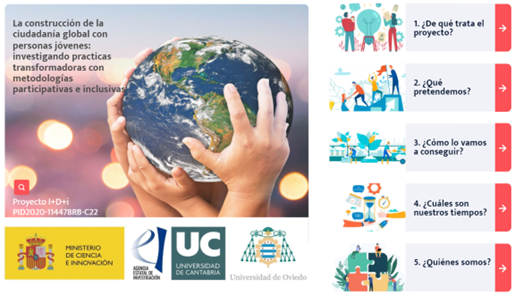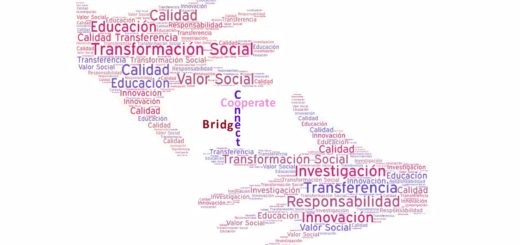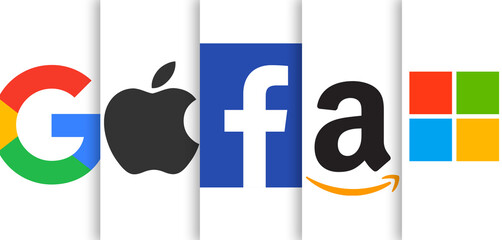Building global citizenship in the age of digital capitalism
In recent years, many voices have emphasised the need to review the socio-educational processes through which collective identities are constructed with a view to incorporating the global dimension. In 21st century societies, identities are constructed far beyond the local context, in spaces characterised by volatility, uncertainty, complexity and ambiguity (Stein, 2021; Davies, Ho, Kiwan et al. 2018; Elliot, Fourali & Issler, 2010). Doing so is no easy task, especially when the ecosystems we inhabit today do not fit the traditional binary parameters of local-global, physical-virtual or natural-artificial. Critical and post-critical pedagogies suggest there is a need to critically analyse the ethnocentrism, androcentrism and anthropocentrism of the very concept of citizenship (Andreotti, 2010; Torres, 2019).
Within the framework of the project “Building global citizenship with young people: researching transformative practices with participatory and inclusive methodologies”, our aim is to understand how global citizenship is built with young people aged 14-16 in different spaces and through different types of experiences (face-to-face/virtual, local/national/international, formal/informal and so on).

“Building Global Citizenship with Young People” Project
In the digital capitalist society, communication education has lately become a key dimension in these citizenship building processes. Much of the information we handle and the communications we engage in take place in virtual space. Such communication significantly shapes how we understand and navigate the world, how we make decisions as citizens (digital citizenship), how we exercise democracy, how we vote and so on. It is clear that in order to participate and survive in a democratic society, young people need to be digitally literate. For this reason, we need an understanding of how they exercise their citizenship in virtual environments, how they access these spaces and, in particular, how they construct their own identity (Fueyo, Rodríguez-Hoyos & Hoeschmann, 2018). The research we are aware of (UNICEF, 2002; Gómez & Calderón, 2022) seems to suggest that young people place a high value on digital spaces as spaces for participation, for expressing their identity and, above all, for interacting with their peers. For this reason, it is important to take a closer look at the ways in which they navigate the new digital communication ecosystems and what kind of citizenship they exercise within them. How do they participate? Do they express their opinions or not? What link is there between this kind of participation and their real-world participation? How and where do they find information and how do they judge the reliability of the wealth of information they receive? What issues do they and don’t they get involved in? A key question for us is also whether young people’s socio-economic circumstances lead to different ways of using technology that are linked to social inequalities. It would appear that these inequalities are not being overcome through education and may be leading to lower digital participation. As a consequence, the exercise of citizenship among the most vulnerable groups may be compromised, as some of the latest studies have shown (Morduchovicz, 2021; Jiménez, Garmendia & Casado, 2018).
References
Andreotti, V. (2010). Postcolonial and post-critical Global Citizenship Education. In G. Elliot, C. Fourali and S. Issler. Education & Social Change: connecting local and global perspectives. (223-245). Continuum International.
Davies, I., Ho L-C., Kiwan, D., Peck, C. Peterson, A., Sant, E. & Waghid, Y. (eds.) (2018). The Palgrave Handbook of Global Citizenship and Education. Palgrave-Macmillan.
Elliot, G., Fourali, C. & Issler, S. (2010). Education & Social Change: connecting local and global perspectives. Continuum International.
Fueyo, M.A., Rodríguez-Hoyos, C., & Hoechsmann, M. (2018). Construyendo ciudadanía global en tiempos de neoliberalismo confluencias entre la educación mediática y la alfabetización digital. RIFOP: Revista interuniversitaria de formación del profesorado: continuación de la antigua Revista de Escuelas Normales, 32, 57-68.
Gómez-Miguel, A. & Calderón-Gómez, D. (2022) El ocio digital de la población adolescente. Madrid: Centro Reina Sofía sobre Adolescencia y Juventud. Fundación FAD Juventud.
Jimenez, E., Garmendia, M. & Casado, M.A. (2018). Entre Selfies y Whatsapp Oportunidades y Riesgos. Gedisa
Morduchovicz, R. (2021). Adolescentes, participación y ciudadanía digital. Fondo de Cultura Argentina
Stein, S. (2021) Reimagining global citizenship education for a volatile, uncertain, complex, and ambiguous (VUCA) world. Globalisation, Societies and Education 19(4): 482-495.
Torres, C.A. (2019). Theoretical and Empirical Foundations of Critical Global Citizenship Education. Routledge .
UNICEF (2022). Impacto de la tecnología en los adolescentes. Relaciones, riesgos y oportunidades.

Authors:
Fueyo Gutiérrez, Aquilina
Braga Blanco, Gloria
Hevia Artime, Isabel
Fano Méndez Santiago
Grupo IETIC-EVEA
Universidad de Oviedo






